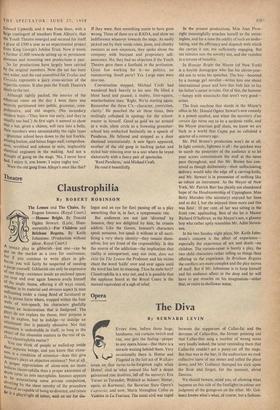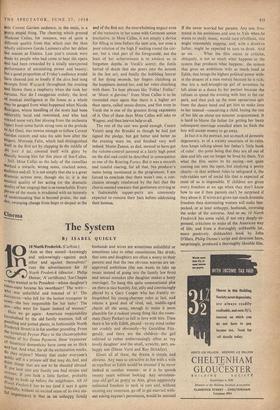Opera
The Diva
By BERNARD LEVIN EVERY time, before those huge, handsome, red curtains twitch and rise, one gets the feeling—proper to any opera house—that there is a miracle waiting behind them. Very L occasionally there is. Hotter and em Flagstad in the last act of Walkiire (even on that never-to-be-forgOtteh night when Hotter; clad in what seemed like half a dozen galvanised zinc dustbins, fell off the scenery); Eva Turner as Turandot; Welitsch as Salome; Hotter, again, as Kurwenal; the Bavarian State Opera's Capriccio; and now, Maria Meneghini Callas as Violetta in La Traviata. The usual civil war raged between the supporters of Callas-fat and the devotees of Callas-thin, the former pointing out that Callas-thin sang a number of wrong notes very loudly indeed, the latter reminding them that Callas-fat couldn't act a pussy-cat off the stage. But that was in the bar; in the auditorium we took collective leave of our senses and yelled the place down, and Mr. Gollancz thumped his stick upon the floor and forgot, for the moment, about Destinn.
We should beware, mind you, of allowing what happens on this side of the footlights to colour our judgment of the goings-on on the other. Mr. Gol- lancz knows what's what, of course; but a fashion- able Covent Garden audience, in the main, is a pretty stupid thing. The cheering which greeted. Madame Callas, for instance, was of quite a different quality from that which met the then Wholly unknown Gerda Lammers after her debut last season as Elektra. Last year's sounds were made by people who had come to hear the opera and had been rewarded by a totally unexpected performance of astonishing power and beauty; but a good proportion of Friday's audience would 'lave cheered just as loudly if the diva had sung excerpts from Wozzeck throughout the evening and blown them a raspberry when she took her curtains. Nor do I exaggerate unduly; the level of musical intelligence in the house as a whole May be gauged from what happened when Nicola kescigno, whose handling of the score had been admirably lucid and restrained, and who had Coaxed some very fine playing from the orchestra (apart from some harsh string tone in the prelude to Act One), was unwise enough to follow Covent Garden custom and take his solo bow after the singers; Moronia Felix, which had distinguished Itself in the first act by clapping in the middle of Ah fors' a lui, covered itself with glory by roundly booing him for this piece of lose-Callas.
Still, Mme Callas as the lady of the camellias Worked a miracle, wrong, notes, cracked notes, audience and all. It is not simply that she is a great dramatic actress now, though she is; it is the Musical quality of her acting (or the dramatic quality of her singing) that is so remarkable. Every Phrase of the music is irradiated with an intensity of understanding that is beyond praise; the sud- den, swooping change from hope to despair at the end of the first act; the overwhelming impact even of the recitative in her scene with Germont senior (recitative, to Mnie Callas, is not ,simply a device for filling in time before the next aria, nor even a poor relation of the high F waiting round the cor- ner, but a vital part of the foreground; not the least of her achievements is to awaken us to forgotten depths in Verdi's score); the futile hatred of death that she pours into the lament in the last act; and finally the hobbling horror of her dying' seconds, her fingers clutching at the happiness denied her, and her voice clutching with them. To hear phrases like 'Follia! Follia!' or 'Morir si giovine!' from Mme Callas is to be reminded once again that there is a higher art than opera, called music-drama, and that even in Verdi she is one of the greatest living exponents of it. One of these days Mme Callas will take to Wagner, and then heaven help us all.
The rest of the cast was good enough. Cesare Valetti sang the Brindisi as though he had just signed the pledge, but got better and better as the evening wore on, and finished very well indeed. Mario Zanasi, as dad, seemed to have got the volume-control jammed at a fairly high point on the dial and could be described in consequence as one of the Roaring Fortes. But it was a smooth and tuneful roaring, for all that. No producer's name being mentioned in the programme, I am forced to conclude that there wasn't one, a con- clusion strongly reinforced by the fact that the chorus seemed unaware that gentlemen arriving at a fashionable supper-party are commonly expected to-remove their hats before addressing their hostess.



































 Previous page
Previous page